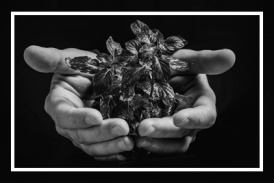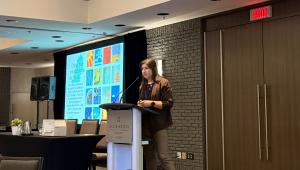Mind the Gap: Study Reveals Disconnect Between Radon Awareness and Mitigation in Sweden
Despite Rising Awareness, Radon-Induced Lung Cancer Risks Remain
For Swedish dwellings, a radon measurement is run with long-term alpha track detectors and if the radon level is high (above the reference level of 200 Bq/m3), then a radon mitigation system can be installed to reduce radon to a safer level. A post-mitigation radon measurement is then run to confirm that the radon inside the dwelling has been reduced to below 200 Bq/ m3.
Vanda Jakabová of Radonova Laboratories presented the topic, “Radon Mitigation in Swedish Single-Family Houses: A Decade of Progress.” Her study compared the effectiveness of radon mitigation measures in Sweden over a decade apart. Jakabová evaluated two datasets of radon measurements in 1,640 Swedish dwellings from 2007-2012 and 2,222 Swedish dwellings from 2019-2024. Both pre-and post-mitigation radon levels were documented. Three tables of data were presented.
- Table 1: All data including homes with and without blue concrete.*
- Table 2: Homes without blue concrete by foundation type – basement, crawl space, and slab on ground.
- Table 3: Homes with and without blue concrete by home ventilation type – self extraction, mechanical exhaust with heat recovery, and mechanical supply with exhaust ventilation.
*Blue concrete was a material widely used in Swedish construction from the 1920s to 1970s. The material is based on uranium-rich alum shale that is associated with higher concentrations of radon in buildings and dwellings where it was used.
Post-Mitigation Results Over Ten-Year Period
The research suggests that the effectiveness of radon mitigation has not improved over the last decade. When pre-and post-mitigation results were compared, the percentage of homes with radon levels below the action level were about the same over the 10-year period. The rate of homes achieving reduced radon levels after mitigation had not increased
“We know radon mitigation absolutely works,” says Jakabová, “This is something the public should be curious about. Why haven’t we seen more progress?” A possible reason is the discontinuation of Sweden’s radon remediation grant, which supported homeowners with mitigation costs from 1988 to 2015, then briefly again from 2018 to 2021.
Radon Awareness Progress
Jakabová also presented an assessment of the impact of Sweden’s state-led radon awareness efforts to reduce radon in homes to below the action level of 200 Bq/m3. Awareness of radon risks in Sweden has increased to 81% over the last 10 years, yet the understanding of what to do (i.e. testing for radon and mitigating if levels are high) remains low, at less than 50%. “There’s clearly a gap between awareness and action, and we suspect that limited access to resources plays a big role.”
Like Canada, Sweden recognizes radon as a public health concern. More than 3,000 Canadians suffer from radon-induced lung cancer per year. Of the 4,000 cases of lung cancer in Sweden per year, it is estimated that 500 are radon related. “By helping people feel supported —not intimidated—when it comes to testing and mitigating radon in their homes, we can increase awareness and reduce lung cancer in both countries,” Jakabová says.
Zan Jones
Radonova, Inc.
+1 331-814-2200
email us here
Visit us on social media:
LinkedIn
Facebook
YouTube
X
Legal Disclaimer:
EIN Presswire provides this news content "as is" without warranty of any kind. We do not accept any responsibility or liability for the accuracy, content, images, videos, licenses, completeness, legality, or reliability of the information contained in this article. If you have any complaints or copyright issues related to this article, kindly contact the author above.
Outsource Accounts Payable Services Help Real Estate Firms Streamline Financial Operations
Growing at 31.20% CAGR | IoT Security Market Reach USD 73.92 Billion by 2026 Globally
Hammocks Market to Reach USD 768 Million by 2035 | Key Players: Eagles Nest Outfitters, Grand Trunk, Hatteras Hammocks
Więcej ważnych informacji
 Jedynka Newserii
Jedynka Newserii

 Jedynka Newserii
Jedynka Newserii

Konsument

Tylko 35 proc. Celów Zrównoważonego Rozwoju ONZ możliwe do osiągnięcia przed 2030 r. Potrzebna ściślejsza współpraca międzynarodowa
Jak wynika z raportu ONZ, choć w ciągu ostatniej dekady dzięki dążeniu do realizacji przyjętych celów udało się poprawić życie milionów ludzi na całym świecie, to jednak tempo zmian pozostaje zbyt wolne, by dało się je osiągnąć do 2030 roku. Postęp hamują przede wszystkim eskalacja konfliktów, zmiana klimatu, rosnące nierówności i niewystarczające finansowanie. Jak wynika ze sprawozdania Parlamentu Europejskiego, problemem jest także brak ścisłej współpracy międzynarodowej i sceptyczne podejście niektórych państw ONZ.
Przemysł spożywczy
UNICEF: Wszystkie dzieci poniżej piątego roku życia w Gazie cierpią z powodu niedożywienia. Sytuacja jest katastrofalna

Ataki Izraela na Strefę Gazy i jej izolacja doprowadziły do całkowitego załamania podstawowych usług i ograniczenia możliwości dostaw i dystrybucji pomocy humanitarnej – wskazuje UNICEF. W efekcie setki tysięcy Palestyńczyków są w sytuacji ciągłego zagrożenia życia i cierpią z powodu niedożywienia i głodu. Ta klęska dotyczy praktycznie wszystkich dzieci poniżej piątego roku życia. Konflikty są jednym z głównych przyczyn braku bezpieczeństwa żywnościowego, głodu i niedożywienia na świecie. Szczególnie dotyczy to Afryki i Azji Zachodniej.
Prawo
Branża ciepłownictwa czeka na unijną i krajową strategię transformacji. Liczy na większe fundusze i korzystne regulacje

Komisja Europejska zapowiedziała rozpoczęcie w I kwartale 2026 roku prac nad strategią dla ciepłownictwa i chłodnictwa. Nad tym strategicznym dokumentem w zakresie ciepłownictwa pracuje także polski rząd. Branża podkreśla, że obie te strategie będą miały kluczowe znaczenie dla trwającej transformacji w ciepłownictwie, czyli przyszłości ogromnych inwestycji, które czekają sektor do 2050 roku. Jednocześnie apeluje o większe wsparcie tego procesu ze środków publicznych.
Partner serwisu
Szkolenia

Akademia Newserii
Akademia Newserii to projekt, w ramach którego najlepsi polscy dziennikarze biznesowi, giełdowi oraz lifestylowi, a także szkoleniowcy z wieloletnim doświadczeniem dzielą się swoją wiedzą nt. pracy z mediami.



![Nestlé w Polsce podsumowuje wpływ na krajową gospodarkę. Firma wygenerowała 0,6 proc. polskiego PKB [DEPESZA]](https://www.newseria.pl/files/1097841585/fabryka-nesquik_1,w_85,r_png,_small.png)






.gif)

 |
| |
| |
|